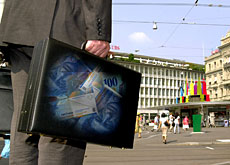
Finance sector looks to regain lost ground

Switzerland is aiming to recapture its status as one of the world's top three financial centres by 2015 with an ambitious reform strategy.
The Swiss financial sector has slipped from second to sixth place internationally in the past two decades, according to the strategy’s authors, who believe that the reforms could add up to 80,000 new jobs and SFr70 billion ($60 billion) to the economy.
The master plan was presented in Zurich on Thursday by the newly restructured Swiss stock exchange together with leading players in the banking, insurance and fund management sectors. It paints a bleak picture of the traditionally strong Swiss financial sector.
The rate of wealth creation in Switzerland has dramatically slowed since the 1980s while in the largest markets, New York and London, growth has rocketed by seven to nine per cent.
A raft of lost opportunities relating to foreign exchange trading, commodities trading, hedge funds and alternative investments have contributed to the malaise, the report states.
“Given the increased competition between financial centres, growth in Switzerland can be expected to slow further if nothing is done to turn the situation around,” said stock exchange chairman Peter Gomez.
According to the reports’ authors, Switzerland must improve research and education, implement stronger regulation to enhance transparency and supervision, have better collaboration between the finance industry and politicians while overhauling taxes and infrastructure.
Wealth creation
The report suggests such changes would allow finance branches to interact more effectively, draw in more skilled workers, encourage hedge funds to set up shop in Switzerland, attract more venture capital and give Swiss firms access to the international pension fund business.
Fine-tuning is also needed to maintain Switzerland’s strengths in private banking and commodities trading, it added.
The authors hope the sector’s contribution to Switzerland’s gross domestic product (GDP) will double to SFr140 billion – increasing its slice of the total GDP from 15 per cent to 30 per cent – and add some SFr11-17 billion in new tax receipts. But this is dependent on the present favourable market conditions lasting until 2015.
Pierre Mirabaud, chairman of the Swiss Bankers Association, told swissinfo that it was better to set the bar high even if certain measures, such as phasing out stamp duty, would be hard to achieve.
“We are always being told that we don’t have a long-term vision. If you don’t have ambition you go nowhere, so it is important to be ambitious,” he told swissinfo.
Political hint
Mirabaud also hinted that the master plan was timed to coincide with next month’s Swiss parliamentary elections.
“We thought that now, with big political discussions going on in Switzerland, it was a good time to make politicians aware of our problems and our suggestions,” he said.
“We have an ongoing dialogue with our politicians. It is very good but it could always be better.”
The Swiss stock exchange set the reform ball rolling on Wednesday by announcing a merger with two clearing and settlement groups to create the Swiss Financial Market Services group by the start of next year.
swissinfo, Matthew Allen in Zurich
The Swiss Finance Sector Master Plan was drawn up by the newly restructured stock exchange, the Swiss Bankers Association, the Swiss Funds Association and the Swiss Insurance Association.
Switzerland is already one of the leading international finance centres, particularly in the fields of private and investment banking and insurance.
Its two largest banks, UBS and Credit Suisse, are major international players while several smaller operators have carved important niches. Insurance firms such as Swiss Re, Swiss Life and AXA Winterthur are among the global leaders.
Last year, the financial sector accounted for SFr70 billion – almost 15% of the Switzerland’s gross domestic product – and 16% of all tax revenues, providing some 200,000 skilled jobs (5% of the total workforce).
In 2005, the sector contributed SFr17 billion in taxes, some 16% of the year’s total tax receipts.
The Swiss National Bank (SNB) raised its key interest rate by a quarter of a percentage point on Thursday – the eighth successive quarterly hike.
The Bank increased the target band for the three-month Swiss franc Libor (London Interbank Offered Rate) to 2.25-3.35 per cent, aiming for the middle of the range.
The move surprised some analysts as the European Central Bank and the Bank of England had previously left rates unchanged.
The SNB continues to expect gross domestic product growth of around 2.5% this year. The Bank also predicts that inflation will run at 0.6% this year and 1.5% in 2008. That compares with its previous forecast of 0.8% for 2007.

In compliance with the JTI standards
More: SWI swissinfo.ch certified by the Journalism Trust Initiative
















![The four-metre-long painting "Sonntag der Bergbauern" [Sunday of the Mountain Farmers, 1923-24/26] had to be removed by a crane from the German Chancellery in Berlin for the exhibition in Bern.](https://www.swissinfo.ch/content/wp-content/uploads/sites/13/2025/12/01_Pressebild_KirchnerxKirchner.jpg?ver=855f1d9f)














You can find an overview of ongoing debates with our journalists here . Please join us!
If you want to start a conversation about a topic raised in this article or want to report factual errors, email us at english@swissinfo.ch.